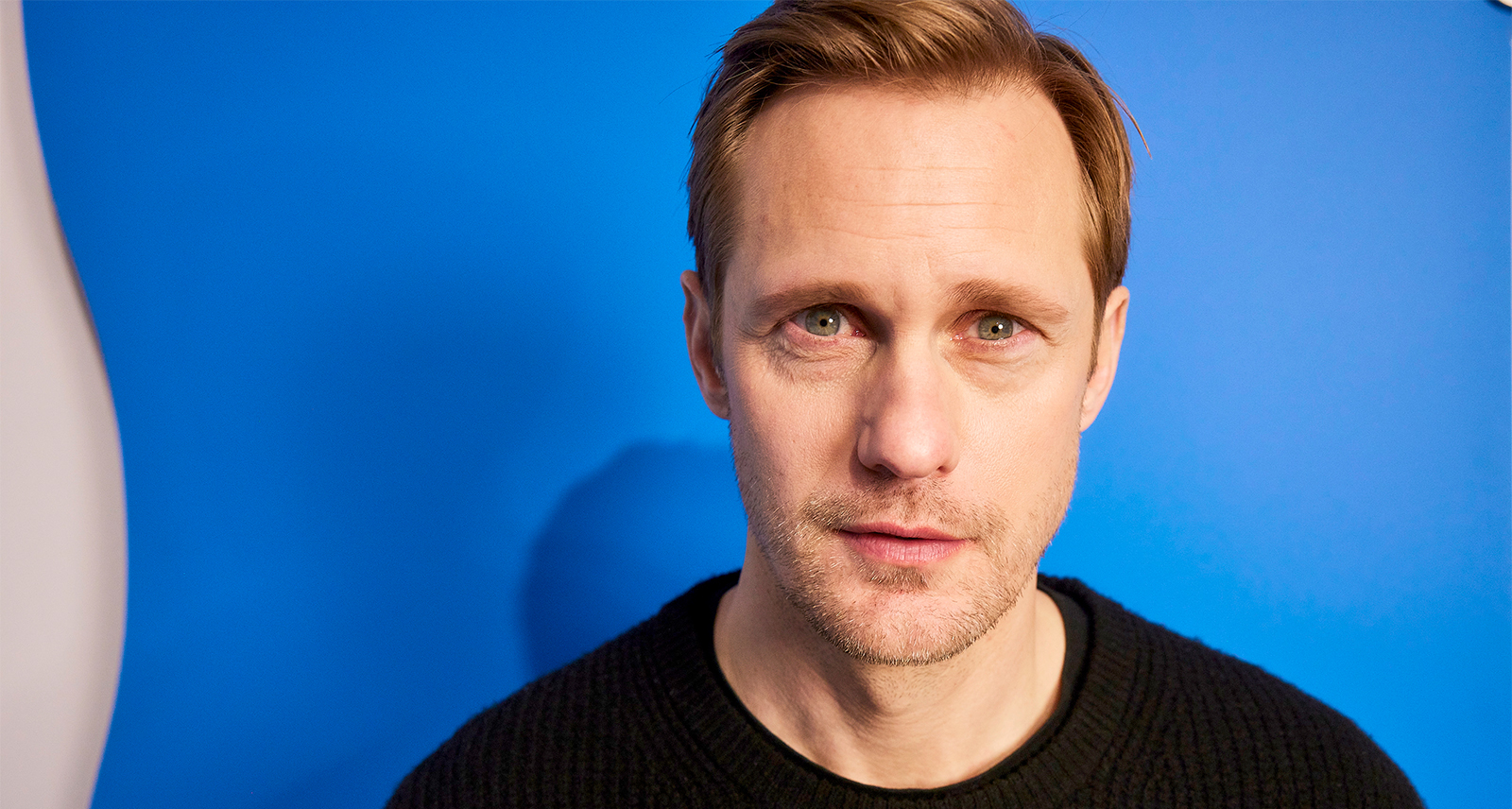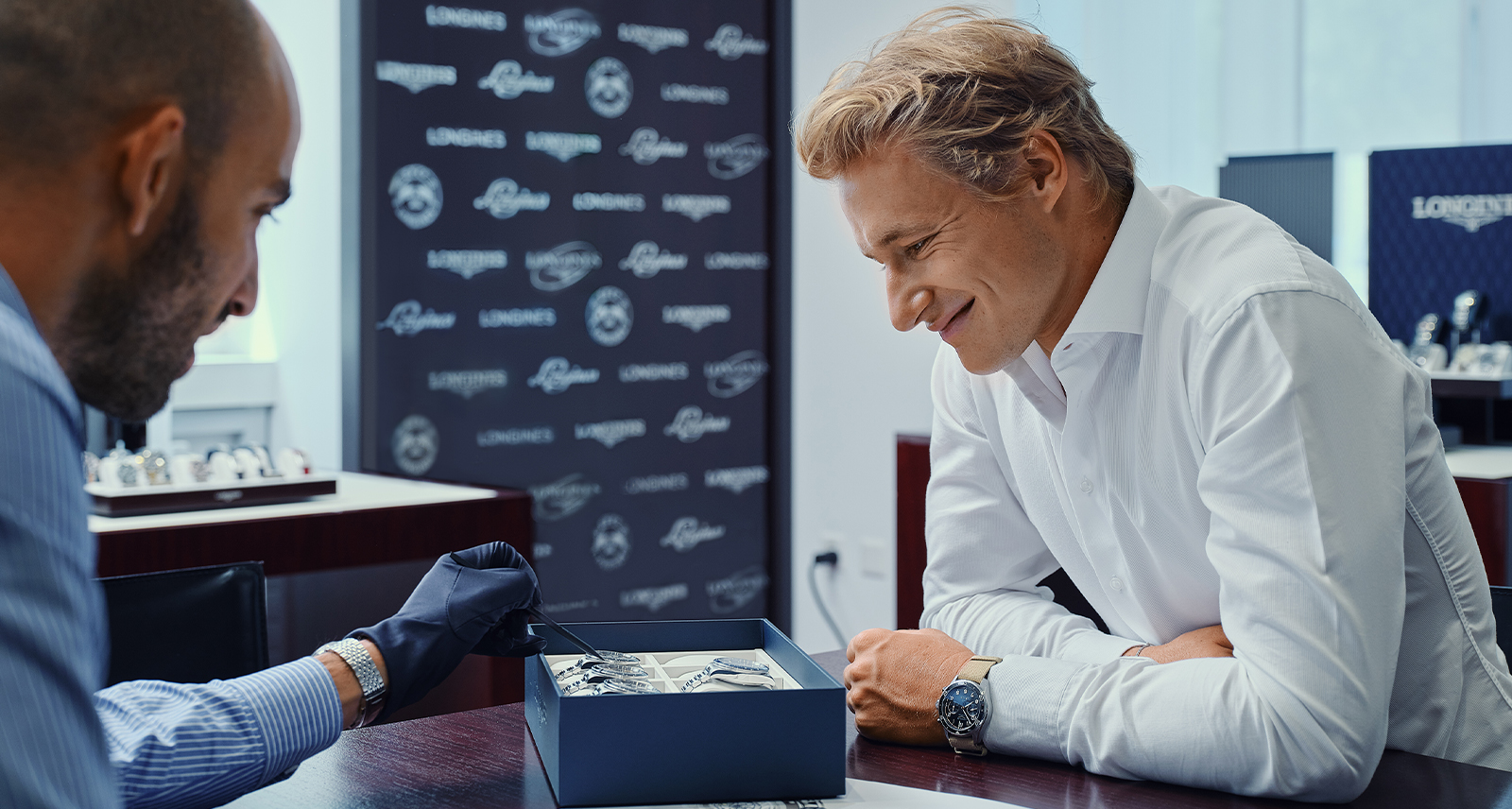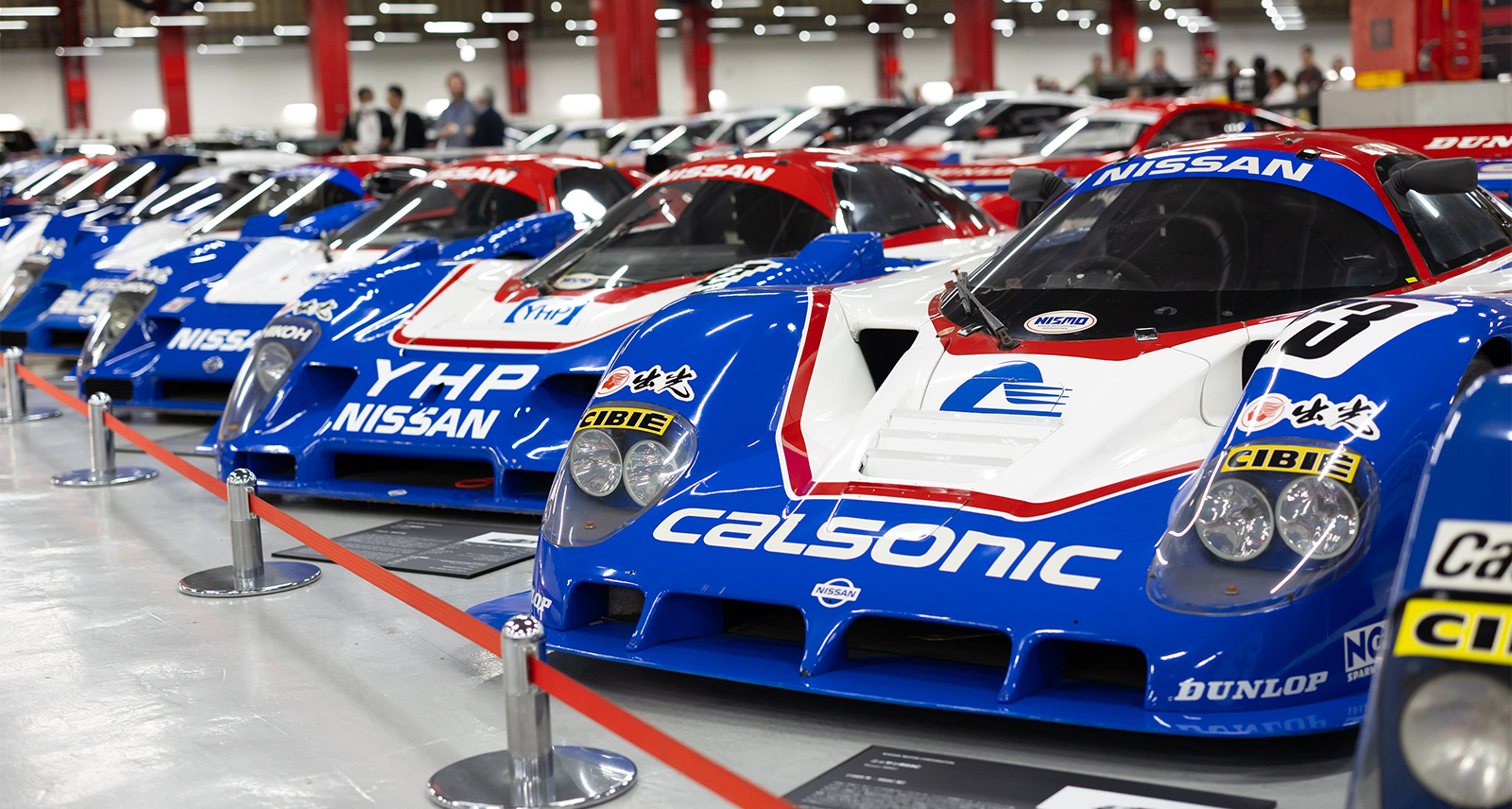Alexander Skarsgård Admits He’s “Quite Boring”
Alexander Skarsgård is mostly a private person who prefers to use his craft as a platform to tame his wild, primal side — and he’s certainly one who opts to wear his Chuck Taylors to a snowy Toronto red carpet premiere of his latest film, Infinity Pool.
The Swedish actor has been digging his teeth into darker roles that are far removed from himself, and roles he finds thrilling. From the abusive husband in Big Little Lies that earned him an Emmy, to the testosterone-fuelled Viking in The Northman, Skarsgård likes tapping into the primal nature demanded of these roles. In Toronto filmmaker Brandon Cronenberg’s horror “Infinity Pool,” he certainly taps into a violent and visceral portrayal of an unsuccessful writer.
The film, which is now playing in theatres, follows James (Alexander Skarsgård) and Em (Cleopatra Coleman), who are on an all-inclusive resort in a fictional country. When Gabi (Mia Goth) and her friends take them outside the resort grounds, James accidentally runs over and kills a local. The punishment is either be executed, or if you can afford it, allow yourself to be cloned and watch the clone killed instead.
Skarsgård is not the classic industry nepo baby some imagine him to be (he’s the son of famed actor Stellan Skarsgård) — his insecurity runs deep; just like his onscreen character James, he too suffers from imposter syndrome. In fact, Skarsgård shared how he thought he was surely getting fired on Generation Kill, his first major role in the U.S. It was only until two months in that he calculated he was likely safe as it would have been too expensive for HBO to recast.
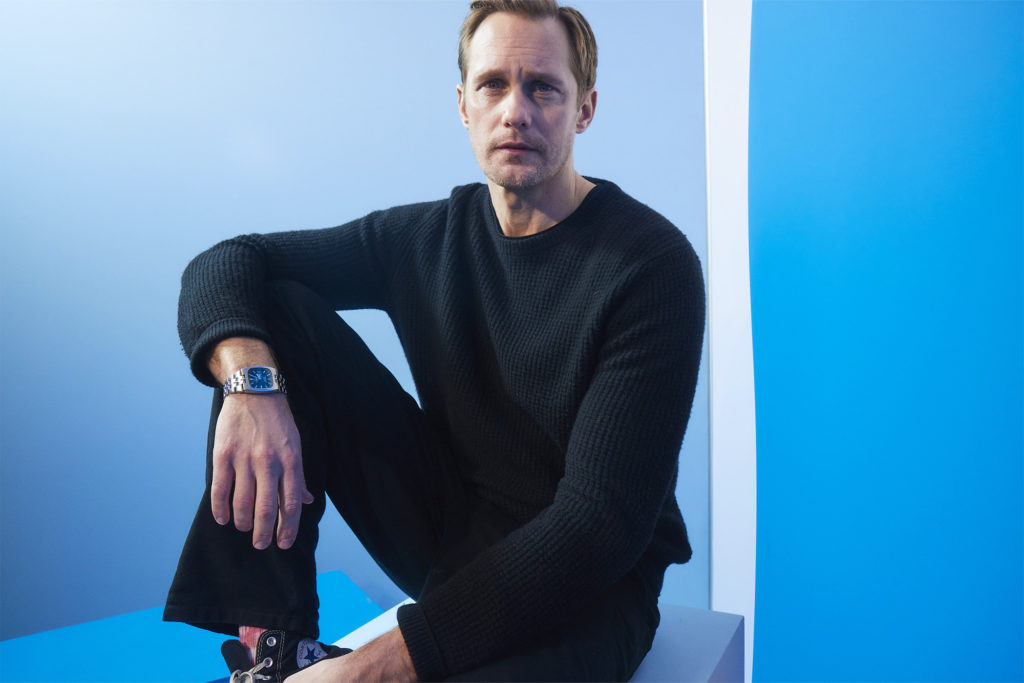
Skarsgård, 46, approaches his roles passionately, studying the ins and outs of his character as if they were his own. He thinks, plans and sleeps on it — structure, for him, is key, he says. So when it came to playing James and his many clones, the actor found himself mapping out the psychological journeys of each one – which he did for himself, really.
The jaw-dropping horror is one that will live rent-free in your mind as Skarsgård frightens, impresses and marvels in his haunting turn. We spoke with the actor about the film, his performance (he apologizes for the nightmares), his process, and his personal style.
I’ve been following your work having seen most of it, from Big LIttle Lies to True Blood to The Northman. So having the luxury to do any kind of role, what were you looking to do next as an artist when this one came your way?
I was sent the script when I was way deep in mud in the Irish soil, shooting The Northman. It was a very, very intense shoot; a tremendous experience and I loved it, but it was very physically and mentally exhausting. James (in this script) is so diametrically opposed to Amleth, my character in The Northman, who’s very much of a testosterone-filled berserker and James is definitely not that. So that was exciting and tonally, I was familiar with Brandon’s work; I had seen both Antiviral and Possessor and I thought they were terrific films and Andrea Riseborough is a dear friend of mine and so obviously, the star of Possessor had spoken so highly of Brandon, what it was like working with him and how he ironically, is the sweetest, most humble, lovely, gentleman which is strange, because the stuff that he comes up with is so dark and twisted. Maybe that’s his… I don’t know if it’s his therapy and he gets it out of his system by writing about it. I found him to be such an inspiring and singular and interesting filmmaker and it’s a gift as an actor to get to play a role like James because the journey he goes on; what he experiences is psychologically absolutely fascinating to me. So I was thrilled to jump on board.
You said that the sweet spot for you is when you’re intrigued by the character and you understand aspects of him, and he makes you curious to learn more. How did that apply to James and the different versions of his clones?
Because there’s so much to interpret, I’m still thinking about it (laughs). It’s such a rich character, and what a treat to get to play three, four versions of the same character and to play around with the juxtaposition between James the author and James the clone, and the different iterations of the clone and what happens to James after the first time he watches the execution of the clone, what happens after the second, third? How does that change him? What does it do to someone psychologically when you have to witness your own death in such a brutal way, where he can’t look away. It’s horrifying. But it’s also exhilarating in a weird way. I found that really interesting to play around with who is James? And also literally who is the character we’re watching? Because it could also be open to interpretation. Is this James or like Dr. Modan says in the movie, ‘Do you ever wonder whether you are the clone and they killed the real James?’ And that was fascinating to me and very interesting to play around with that notion when I was prepping the movie, and honestly shooting it I’d like to leave that open. This could be James but this could also be the clone.
And did you really map out the psychological journeys for all the clones?
I did for myself and then obviously tried to leave room for interpretation for the audience.
There seems to be a through-line with some of your roles because there’s always something primal whether it was the beast quality in The Northman or the wolf in Hold the Dark and now in this you’re wrestling with a naked version of yourself as a dog.
Yeah, I think I guess I’m quite drawn to the primal. The more people that revert back to something more atavistic and that friction that is being human in a modern day society, the friction between functioning in a civilized society. Right now, I’m in New York City, and I’m surrounded by millions and millions of people. But deep down, you also have the more atavistic equality and the more primal qualities and that animal within that we sometimes let out, most often try to suppress and that I find quite fascinating. I think that’s been the through-line in some of my films.
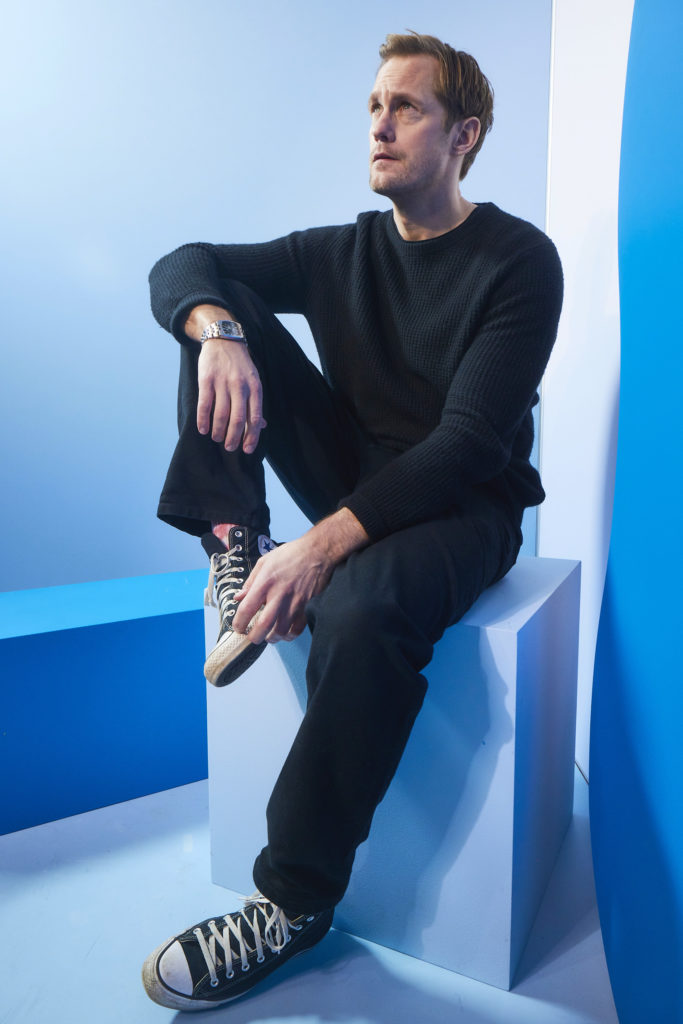

So when it comes to creating roles, you have often said that you like structure and you read the script once a day, every day until shooting. Was it any different with this one?
I do like structure, I compartmentalize so that helps me map out the character and the journey. I do find it very useful to read the script, go over it in prep once a day because it helps me trigger inspiration and discover new things. And even if it’s the 30th time I read the script I’ll notice something that I’ve not noticed before or makes me think about something in a different way. Most of those ideas, I just discard but occasionally you’ll find something that’s really fascinating and that might be even the foundation for the character and you start building off of that.
Did this structure help you process any scene in particular?
It helps me with everything; it helps me understand the character and map it out. The most obvious was the first transformation, the first execution. The first cloning is a pivotal moment because it is the first time James witnessed his own execution and so that was a very big moment and important to understand in deciding how James would react to it. James’ wife is looking away as she’s horrified by it but he is mesmerized by it, almost transfixed by it. And that was fascinating to me to try to kind of go in that direction and see what we discovered.
A few years ago in an interview you were asked what scares you and you said you have the tendency to scare yourself sometimes. So did that happen during the making of this horror when you’re in the process of trying to scare us?
(Laughs) I don’t know if I scared myself but it was definitely intense… (laughs) in a very primal way. I don’t know… working with Brandon was so wonderful and there was so much love and trust there and I really just genuinely believed in his vision for the film and for the role and that’s what it’s all about. Create that trust on a movie set and then you just let yourself go and I feel like most of the cerebral work is done in prep. That’s when you think about the character and you map it out and all this is interesting, but it’s very practical. And the goal is to once you show up on set, you can just hopefully that is somewhere in your systems you don’t overthink it, you don’t actually think about it at all, you can just throw yourself into the situation and where that takes you and on Infinity Pool, as you’ll see in the movie, it took us to some really weird, dark places.
So do you find it thrilling to deep dig into these darker roles that require you to tap into a different aspect of yourself as an artist?
Tremendously. I think I’m privately a very mellow human being. I’m quite content, probably quite boring and so it is thrilling to open up a channel that I never do in real life. It gives me an excuse to tap into that and explore that darkness or wild or more kind of eccentric or crazy or the more primal side of who I am.
James does tend to have this kind of imposter syndrome because when he’s trying to write. Have you ever felt that and when?
I quite often feel that. I’ve been working for quite a few years, but I still feel that. I definitely still struggle with insecurity or feeling that I’m not talented enough or that I’m miscast. The biggest one was probably on Generation Kill, which was my first major role in the U.S. and it was a project that I was incredibly excited about. It was an opportunity to work on it. It was an HBO miniseries about the invasion of Iraq, made by David Simon and Ed burns. They did The Wire show that I was a big, big fan of; It was such a terrific role and I was completely unknown. I hadn’t really worked. I’d done a couple of days on Zoolander, five, six years prior to this, but I definitely wasn’t… I felt that I couldn’t believe I was cast in this really great role in this really great HBO series. I had a very, very strong sense of imposter syndrome there. We were in Africa for seven months shooting it and I was so certain that they would recast and fire me that every day I would figure out how much time or how much money HBO had spent on shooting this and how expensive would it be for them to replace me? So it was like two, three months into production when I realized, well, if they fire me and recast the role, they have to reshoot 40% of the show when that would cost a lot of money. So maybe that won’t happen now. That’s when I first started feeling like I might actually get to finish this job. But up until that point, I was certain that we would get a phone call saying, ‘You were miscast; you’re out!.’
Oh wow. Thank you for sharing that and I think you were well cast in Generation Kill. Before we wrap, I do want to ask you about your red carpet look in Toronto. I love the casual sneakers and T-shirt look in the midst of the snowstorm. Is that your personal sense of style?
Yeah, that was. (laughs). That’s kind of what I wear. I almost missed the red carpet or the Toronto trip didn’t happen because I was flying out from New York and because of the blizzard in Toronto, I was delayed by three or four hours. So that’s why unfortunately, you have to do this over the phone. I was supposed to come in to Toronto and do press in the afternoon and then have to relax a bit and maybe put on some real boots instead of my Chuck Taylors. But instead, I was so delayed that I came straight from the airport to the red carpet.
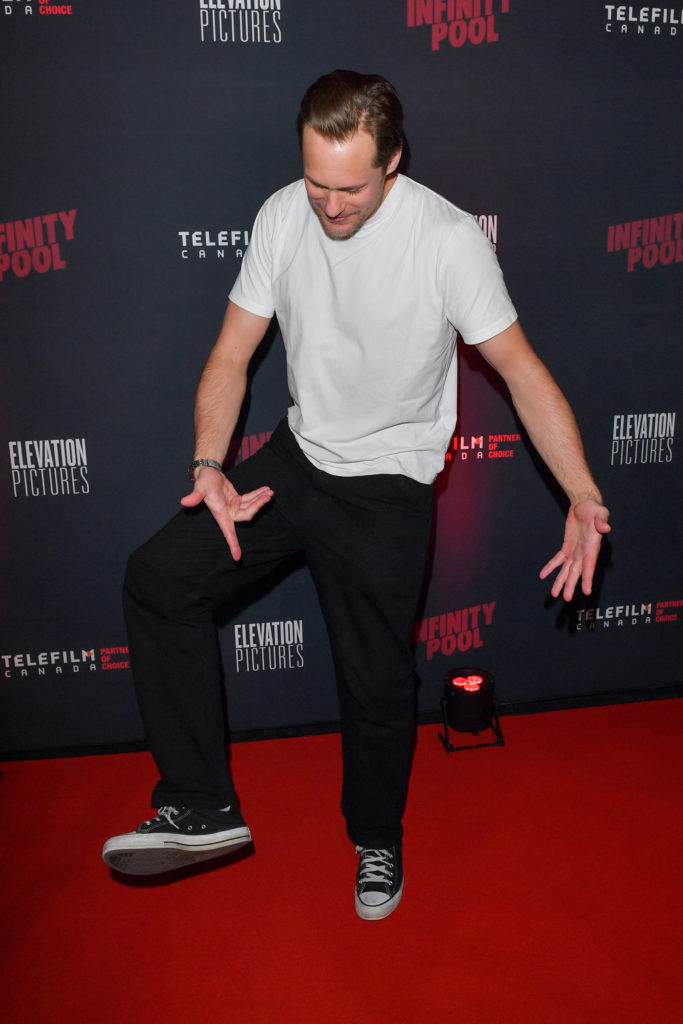
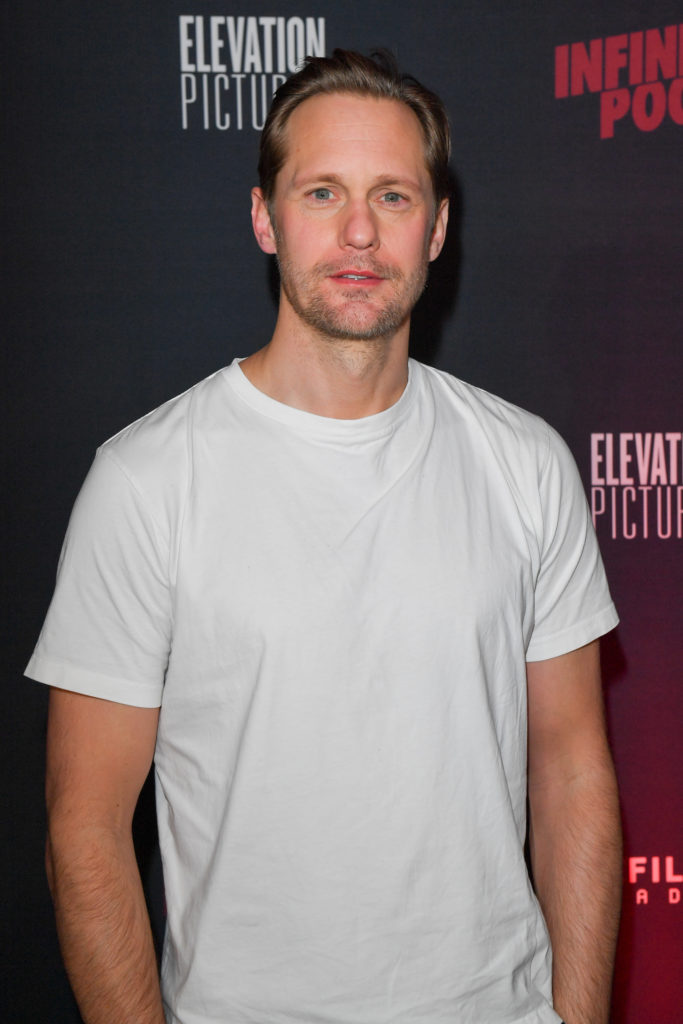
Is that the classic Alex look?
Yeah. I’m on the road so much that I love to travel with just carry on, which means I have to really plan what to pack. So I can only bring one pair of shoes, maybe two pairs of trousers and one or two sweaters. That even goes for when I’m home. Like I don’t have much clothes. And I prefer to have items that I really love to wear and I don’t really feel the need to have 45 different pairs of sneakers on. If I love my sneakers and have one of them for two years and when I need a new pair, I’ll buy a new pair. But that’s all I really need and the same goes for all my clothes.
That’s very minimal and I love to hear that. Glad you made it out to Toronto!
I’m really glad. It was important for me to come out there because again, Brandon’s hometown and most of the crew and even some of our producers are from there. So it was on this tour that we’ve been doing Sundance, New York and we’re going to the Berlin Film Festival next month. It was really not only because I love Toronto, it’s always fun to be there. But again, to come home to Brandon’s hometown and have a night of celebration together was really really important to me, even though I almost missed it.
Thank you and congratulations again on the film!
Thank you and I appreciate it.
We’re sure to see more of Skarsgård, who is currently filming season four of the HBO familial drama Succession. He was introduced in season three as tech mogul Lukas Matsson and we’ll be seeing a lot more of him in the new season.
Infinity Pool is now playing in theatres.
